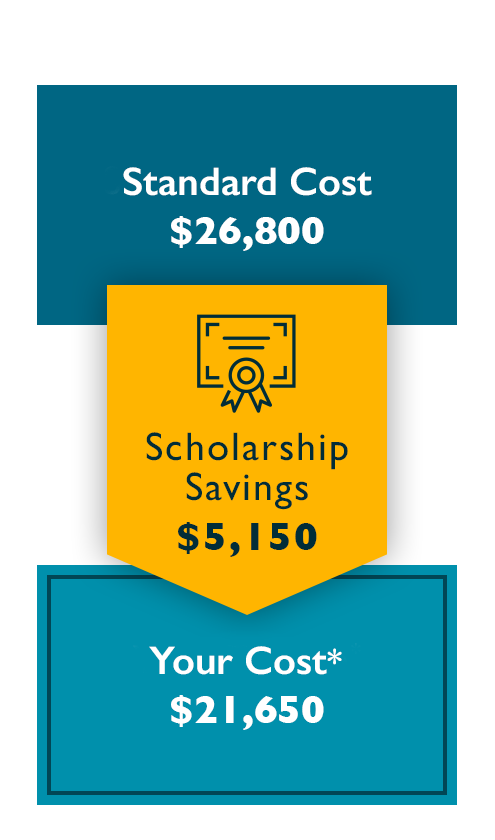Why Choose Walden?
Program Details
Curriculum
Minimum Degree Requirements
- 50 quarter credits
- Foundation courses (5 cr.)
- Core courses (35 cr.)
- Elective course (5 cr.)
- Capstone course (5 cr.)
View the COMPLETE CURRICULUM PLAN
This sequence represents the minimum time to completion. Time to completion will vary by student, depending on individual progress and credits transferred, if applicable. For a personalized estimate of the number of your transfer credits that Walden would accept, call an Enrollment Specialist at 855-646-5286.
Admission Requirements
Program Admission Considerations: A bachelor's degree or higher.
General Admission Requirements: Completed online application and transcripts. Please note that the materials you are required to submit may vary depending on the academic program to which you apply. More information for international applicants.
| Curriculum Component | Requirements | Cost | amount |
|---|---|---|---|
| Tuition | 50 quarter credit hours | $515 per quarter hour | $25,750 |
| Program Fee | Per quarter | $175 | $1,050 |
| $26,800** | |||
| BELIEVE & ACHIEVE SCHOLARSHIP YOUR TUITION | -$5,150 $21,650* | ||
*Represents the General Program, minimum time to completion, and Believe & Achieve Scholarship. Your actual total program time and costs may vary. Believe & Achieve Scholarship savings based on current tuition. See Scholarship Details for more information.
**Tuition reflects the minimum time to completion. Time to completion varies by student, depending on individual progress and credits transferred, if applicable. Tuition and time to complete may be reduced if transfer credits are accepted, or if you receive grants, scholarships or other tuition reductions. Walden may accept up to 25 transfer credits. For a personalized estimate of the number of your transfer credits that Walden would accept, call an Enrollment Specialist at 855-646-5286.
Tuition and fees are subject to change. Books and materials are not included and may cost between $1,000 and $1,400.
Program Outcomes
What’s the Career Impact of Earning a Master’s in Health Education and Promotion
What Can I Do With a Master’s in Health Education?
A master’s in health education degree from Walden can prepare you for a number of direct service or leadership positions in academic, clinical, community, or corporate settings. These include:
- Health educator/counselor
- Health promotion specialist
- Health coach/wellness coach
- Health coalition specialist
- Community health/outreach coordinator
- Health education specialist/director
Career options may require additional experience, training, or other factors beyond the successful completion of this online master’s in health education degree program.
Increase Your Earning Potential
A master’s degree can potentially lead to higher earnings. The salary difference between a bachelor’s and master’s degree is significant, according to Burning Glass Technologies: Labor Insight™:2
- Associate degree: $48,600
- Bachelor’s degree: $51,000
- Master’s degree: $73,400
Learning Outcomes
Graduates of Walden’s online MS in Health Education and Promotion will be prepared to:
- Examine historic milestones, current challenges, and future trends related to health and health education.
- Analyze biological, social, political, cultural, environmental, and behavioral factors that impact individual and population health.
- Assess community needs and capacity for health education.
- Develop culturally tailored health education programs and communication using health behavior theories and models.
- Evaluate the effectiveness of health education programs, communication, and research.
- Apply key leadership concepts and skills to effectively administer health education programs and services.
- Utilize best practices of health communication to promote and advocate for individual and population health.
- Apply research principles and methods to address 21st-century health challenges.
Testimonials
Related Articles
You May Also Be Interested In
FAQ About Walden’s Online MS in Health Education and Promotion
Given the multiple ways that the health education and promotion field can impact the lives of communities, it should be no surprise that health educators and other health education and promotion professionals work in a variety of settings. Careers in public health and education include positions with community health agencies, state and local health departments, schools and universities, businesses and corporations, faith-based organizations, hospitals and clinics, and nonprofit organizations, including those focused on global health education programs. In addition to serving as health educators for specific organizations and populations, common responsibilities for those in the health education and promotion field include preparing for and responding to emergencies, designing and advocating for health-related policy, writing grants, leading public health departments and nonprofits, and using social entrepreneurship to enact social change and improve the health of at-risk communities.
Health education and promotion is the bridge between what experts learn about health and safety and how we use that knowledge as a society. Health educators and others in the field are skilled at analyzing the biological, social, political, cultural, environmental, and behavioral factors that impact individual and population health. And they’re skilled at using that health data to assess a given community’s need for health education (i.e., determining gaps in public knowledge); develop plans, programs, and other ways to implement health education and policy; determine the right communication strategies for informing populations of specific health risks/solutions; and evaluate the effectiveness of health programs and policy, with the intent of improving them where needed. While no one person within the health education and promotion field does all of this, the field as a whole provides a wide range of services.
Candidates who earn their master’s degree in health education and promotion benefit from in-depth and research-based courses. In Walden University’s MS in Health Education and Promotion program, you will take courses such as:
- Exploring Health Education in the 21st Century
- Health Behavior Theory
- Public Health Administration and Leadership
- Grant Writing
- Program Planning, Implementation, and Evaluation
These courses help prepare you for a career as a public health educator. Furthermore, you can choose specializations such as Emergency Preparedness and Population Health, which may help you stand out when you apply for relevant positions.
Certified Health Education Specialist (CHES) certification establishes a national standard for members of the profession and shows prospective employers that an individual is proficient in certain knowledge and skills. Earning your CHES certification not only unlocks the opportunity to further your career and earning potential, but also enables you to become a part of a global movement to positively impact world health. To become certified, you must pass an exam administered by the National Commission for Health Education Credentialing Inc. To apply to take the exam, you must meet certain academic requirements, as well as submit official transcripts indicating a major in health education and completion of at least 25 semester hours of work addressing the Areas of Responsibility and Competency for Health Education Specialists.1
1Source: www.nchec.org/ches-exam-eligibility
As a student in Walden’s online master’s in health education and promotion program, you can take advantage of an online learning format that allows you to complete coursework from anywhere you have internet access. Plus, you have the flexibility to attend class at a time of day that works best for your schedule.
1Source: NCHEC News, DBPPP Announces Annual Top Ten List of CHES® Candidate-Producing Professional Preparation Programs for 2017.
2Source: Burning Glass Technologies: Labor Insight™. Results for salaries are at the national level and may not reflect local and/or short-term job conditions, do not guarantee actual salaries, and are subject to change.
Note on Certification:
The MS in Health Education and Promotion has been designed to reflect the Areas of Responsibility for Health Educators outlined by the National Commission for Health Education Credentialing (NCHEC) and to prepare students to sit for the national Certified Health Education Specialist (CHES) and Master Certified Health Education Specialist (MCHES) exams. Walden Enrollment Specialists can provide information relating to national certification exams; however, it remains the individual’s responsibility to understand, evaluate, and comply with all requirements relating to national certification exams for the state in which he or she intends to practice. Walden makes no representations or guarantee that completion of Walden coursework or programs will permit an individual to obtain national certification. For more information about the CHES and MCHES exams, students should visit http://www.nchec.org.











